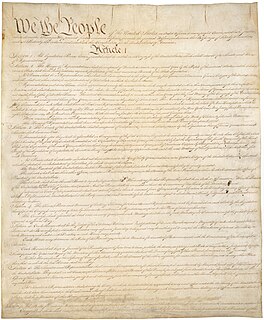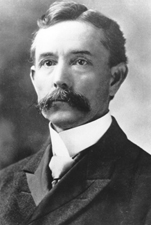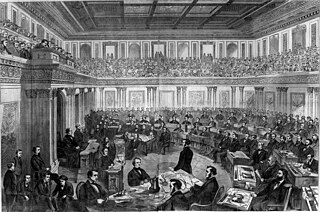| This article is part of a series on the |
| United States Senate |
|---|
 |
| History of the United States Senate |
| Members |
| Politics and procedure |
| Places |
The United States Constitution gives the Senate the power to expel any member by a two-thirds vote. This is distinct from the power over impeachment trials and convictions that the Senate has over executive and judicial federal officials. The Senate concluded in 1798 that Senators could not be impeached, but only expelled, while conducting the impeachment trial of William Blount, who had already been expelled. [1]

The United States Constitution is the supreme law of the United States. The Constitution, originally comprising seven articles, delineates the national frame of government. Its first three articles embody the doctrine of the separation of powers, whereby the federal government is divided into three branches: the legislative, consisting of the bicameral Congress ; the executive, consisting of the President ; and the judicial, consisting of the Supreme Court and other federal courts. Articles Four, Five and Six embody concepts of federalism, describing the rights and responsibilities of state governments, the states in relationship to the federal government, and the shared process of constitutional amendment. Article Seven establishes the procedure subsequently used by the thirteen States to ratify it. It is regarded as the oldest written and codified national constitution in force.

The United States Senate is the upper chamber of the United States Congress, which along with the United States House of Representatives—the lower chamber—comprises the legislature of the United States. The Senate chamber is located in the north wing of the Capitol, in Washington, D.C.

Impeachment in the United States is the process by which the lower house of a legislature brings charges against a civil officer of government for crimes alleged to have been committed, analogous to the bringing of an indictment by a grand jury. At the federal level, this is at the discretion of the House of Representatives. Most impeachments have concerned alleged crimes committed while in office, though there have been a few cases in which officials have been impeached and subsequently convicted for crimes committed prior to taking office. The impeached official remains in office until a trial is held. That trial, and their removal from office if convicted, is separate from the act of impeachment itself. Analogous to a trial before a judge and jury, these proceedings are conducted by upper house of the legislature, which at the federal level is the Senate.
Contents
- Expelled senators
- Expulsion proceedings not resulting in expulsion
- Censured senators
- See also
- Notes
- References
Expulsion has not occurred since the Civil War, which most of the expulsions were related to, although this is partly because many members resign rather than face a formal proceeding when expulsion appears possible. Censure, a lesser punishment which represents a formal statement of disapproval, has been more common in the 19th century. Although censure carries no formal punishment, only one Senator (Benjamin R. Tillman) of the nine to be censured has ever been re-elected. Unlike the House of Representatives, which also disciplines by reprimand, a censure is the weakest form of discipline the Senate issues.
A censure is an expression of strong disapproval or harsh criticism. In parliamentary procedure, it is a debatable main motion that could be adopted by a majority vote. Among the forms that it can take are a stern rebuke by a legislature, a spiritual penalty imposed by a church, or a negative judgment pronounced on a theological proposition. It is usually non-binding, unlike a Motion of no confidence.

The United States House of Representatives is the lower chamber of the United States Congress, the Senate being the upper chamber. Together they compose the legislature of the United States.






